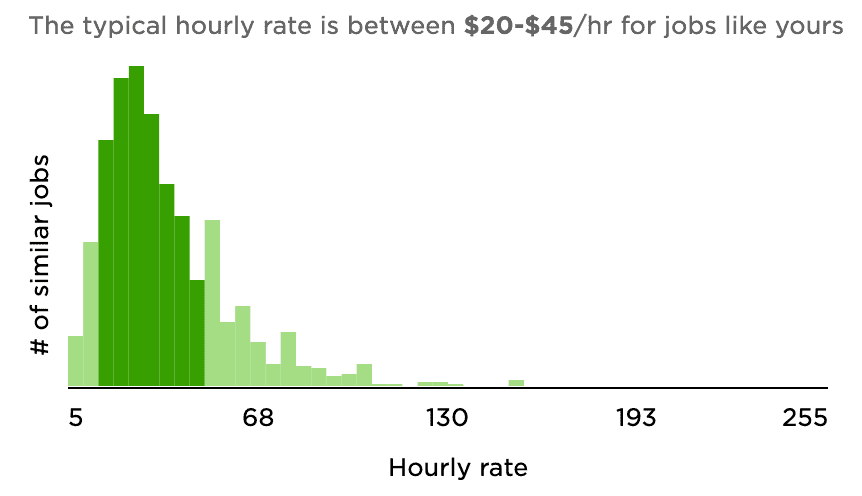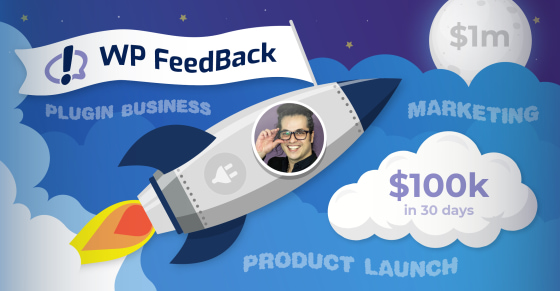|
|
Plugin development is one of many ways to make money with WordPress, but if you’re just starting out as a plugin developer, figuring out the path to success isn’t easy. That’s why I put together this in-depth guide on how you can make money using your coding skills as a plugin developer!
The main ways to make money as a plugin developer include:
- Selling commercial WordPress plugins
- Offering customization of your plugin
- Custom plugin development
- Educating others about plugin development
While some of these might sound similar, they are very unique, so let’s go through each one and help you get started with a few suggestions about the best approaches to making money (or developing a long-term career or business) in each area.
Selling Commercial WordPress Plugins
There are a ton of best practices to know when you’re selling plugins, so it’s important to build the knowledge you need before jumping into this business.
There isn’t one way to sell plugins, but there are a few factors to consider before you actually start selling, including what kind of product you want to sell, your business model, how to price and market your product, and what kind of platform you want to use to distribute your plugin.
Business & Pricing Model
When planning development of a WordPress plugin, it’s important to consider the architecture of your code – if you’ll structure it as one solution with all features or if you’ll split features into multiple add-ons.
In addition to this, many developers in the WordPress ecosystem take advantage of the freemium pricing model by offering a free version of their plugin on the WordPress.org repository, which exposes your product to thousands of users at no cost, and gives you useful data to get started in building a high quality product.
Leveraging the repository for freemium distribution is one of the best ways to get started selling your first plugins – by converting users from your free to your paid product.

Whether you choose the freemium model or not, there are 3 primary ways to sell and distribute WordPress plugins, including Marketplaces, self-hosted solutions, or managed SaaS platforms. Let’s briefly go into the difference between each.
Marketplaces
Marketplaces let you submit your plugin to get a public listing page where customers can make their purchase. Marketplaces handle every aspect of the sales & fulfilment processes on your behalf, including marketing your product, accepting payments, generating license keys, and even collecting reviews that show up on your page.
Marketplaces can be a great place for first-time developers to start selling because of the marketing opportunity they provide, but because marketplaces often take high sales fees and are mainly based on selling lifetime licenses, they do not offer an easy way for plugin developers to create a sustainable revenue stream.

Self-Hosted Solutions
One of the main alternatives to marketplaces are self-hosted platforms, like WooCommerce or Easy Digital Downloads. These platforms let you self-host your own eCommerce store to sell your digital products, requiring that you customize your licensing, payment gateways, tax mechanism (to charge proper rates for EU VAT), user dashboard, and much more.
Managed SaaS (Software-as-a-Service) Platforms
SaaS platforms like Freemius let you sell plugins without installing, configuring, and maintaining an eCommerce platform yourself. While they generally don’t handle marketing on your behalf, SaaS platforms take most of the “heavy-lifting” out of the equation.
Once you’ve decided on one of the 3 approaches above, take careful consideration of the time you have left available for marketing, as marketing will be one of the determining factors in your success and how much money you can make.
How much money can you make selling WordPress plugins?
The most successful plugin businesses I’ve seen are laser focused on building MRR (Monthly Recurring Revenue) through a subscriptions-first pricing model.
The most successful plugin businesses I’ve seen are laser focused on building MRR (Monthly Recurring Revenue) through a subscriptions-first pricing model.
The best way to share you much you can make is with an example. Let’s take a few general stats for a regular plugin business and crunch some numbers
10,000 Active Users X 2% Conversion Rate = 200 Sales/year
200 Sales/year X $100 Annual License = $20,000 Gross Revenue
To get an idea of how likely it is to get there, some of our friends at Kinsta and iLoveWP have put together great stats on the topic.
Just over 1% of plugins on the WordPress.org repository have over 10,000 active installs. If you’re a focused plugin developer and work on your marketing, you can certainly get there.
Just over 1% of plugins on the WordPress.org repository have over 10,000 active installs. If you’re a focused plugin developer and work on your marketing, you can certainly get there.
Furthermore, you don’t have to run your business forever, As your MRR increases, your business becomes more valuable, and this list of plugin developers proves it. There are tons of transparency reports from some of the largest plugin development shops out there that also show millions in annual revenue.
Mergers and acquisitions are becoming more and more frequent in the WordPress space, and major changes in the ecosystem, like the possible Automattic IPO, are bringing WordPress into the investor spotlight in a new way, so the opportunities are only getting bigger at this point if you want to sell your entire business or specific plugins down the road.
Offering Customization of Your WordPress Plugin
Once you’ve built a fully-functional plugin that achieves its intended purpose (regardless if you decide to sell it or offer it for free), you can start offering customization of your plugin for all kinds of features, integrations, and specific use-cases your users might request.
Let’s talk about the different types of customization requests you might get for your plugin.
Adding New Features
Feature requests are an inevitable and opportunistic part of developing plugins – I can tell you from personal experience. Feature requests can be extremely valuable – not only can they give you ideas for your product roadmap, but they can give you ideas for new plugins.
When you get feature requests that will take a lot of your time, your first thought might be to tell the customer that you’ll add it to your roadmap or consider developing it, but it won’t be released for quite a long time.
While it might seem counterintuitive to build features for just one user, you can charge an hourly rate and make a significant amount of money if that user needs your time and services badly enough. It’s a win-win.
So, instead of telling the user that the feature will take a long time to implement, you can offer to build the additional feature at your hourly rate if they would like it built more quickly, creating a relationship and collaboration with the customer.
You can then choose to add that feature to your core plugin and sell it as part of one of your paid plans later on.This is a win-win-win, for you, the customer, and future users of the product.
Subscribe and grab a free copy of our WordPress Plugin Business Book
Exactly how to create a prosperous WordPress plugin business in the subscription economy.

3rd Party Integrations
Many users will ask you to integrate your plugin with a 3rd party plugin or service of some kind, which opens your product and business up to a wide range of opportunities.
There are many different approaches you could take here to harness the benefits of integrating with a 3rd party plugin or service, including becoming an affiliate of the 3rd party, co-marketing opportunities if the other service is open to listing you as one of their partners, or simply the benefits of marketing the new integration yourself.
Regardless of which approach you to take, this will be a common request, and it’s likely that each situation will have to be handled differently.
The bottom line is that you should be charging an hourly rate of fixed fee to build this kind of integration for a specific use case – and that’s your opportunity.
Customizing Your Plugin for Specific Use-cases
While you’ll surely get customization requests for new features or integrations, another type of request you might get is for customization to specific use-cases. Rather than build a feature (that might be used outside of the specific situation of the original user making the request), you might get a request to customize the styling of your plugin’s front-end for that user’s specific site design.
This kind of use-case usually cannot be replicated and resold like a new feature could be, unless you find that the use-cases are extremely frequent, in which case you might include them as part of your first-time user experience or activation process.
How much money can you make offering customization of your plugin?
You can charge anywhere from $20 – $200/hour, which can leave you a pretty solid income if you’re getting regular customization requests. The hourly rate depends on the customer’s geolocation, their budget, the complexity of the customization, and what alternatives the customer has if they don’t hire you.
E.g. – If it’s an easy customization, and they can hire someone from UpWork for the tenth of the price, you might lose the deal. So don’t be shy asking about their budget when you start the negotiation process.
Obviously, your income will depend on the complexity of the requests you get. In the case of some plugins, you might get more customization requests than you have capacity to focus on building what you wanted to build for your plugin in the first place.
Custom Plugin Development
Building custom plugins from scratch or customizing existing plugins is a highly needed service in the WordPress space.
Many WordPress projects often have specialized functionality and agencies have popped up specifically for providing custom plugin development in these situations.
Far different than having your own plugin business, building a custom plugin for someone else’s project means you won’t be able to use any of that code for your own projects without permission. Often-times, however, these projects can be a learning opportunity for you to grow your skills.
If you like diving deep into a technical project and making a perfect and precise solution to fit your client’s exact needs, these are the types of projects for you.
Building custom plugins is another opportunity to get paid hourly, but on a more consistent basis than waiting for a user or customer to make a feature request.
Here are three great places you can find custom plugin development work (and keep in mind that we don’t get any benefit by mentioning any of these).
Upwork
Upwork is a marketplace that connects freelancers and agencies with opportunities of all kinds. By making a profile, you can list your skills, the types of projects you’ve worked on, and your portfolio.
Upwork is great if you’re just starting out as a plugin developer and want to get exposed to new projects. Many of the Clients hiring on Upwork have low budgets or are looking for one-off smaller projects that can give you exposure to a new type of plugin development you may not have done before, so you’ll also build your portfolio depending on the project.
For PHP projects, Upwork developers usually get hired for an average rate between $10 – $45 depending on the skill level of the freelancer. This chart shows their average for their “Expert” projects (the lower skill level jobs had a different chart):

Codeable
Codeable focuses completely on WordPress projects, so if you’re a plugin developer, this platform should fit well within your goals.
Codeable vets their developers and requires a higher level of quality and rigor than the freelancers who can offer their services on Upwork. Upwork freelancers often have no requirement to pass significant testing or stringent requirements of any kind to “prove” their skills.
This means the developers who work with Codeable are more advanced and therefore they charge more per hour. Their pricing page lists developers’ hourly rate at $70–$120 USD (plus Codeable’s 17.5% fixed service fee on top of that amount charged to Clients).
After chatting with Codeable’s co-Founder and CEO, Per Esbensen, at WordCamp 2019 in St. Louis, I discovered that Codeable mainly accepts larger projects with clients that have thought out their requirements in detail, which means Codeable developers tend to be working full-time on various projects simultaneously rather than small one-of or “side-gig” projects.
This makes Codeable a very reliable full or (at minimum) part-time gig for developers that work with them.
Toptal
Toptal stands for “Top Talent” – and they focus on sourcing the top 3% of developers globally. From experience, hourly development costs are set extremely high, but the skillset of the developers on Toptal can’t be matched.
For an hourly position, Toptal developers can expect $125+ per hour (before the Toptal commission), or $8,000+ /month for a full time position. Getting accepted as one of their top developers will take quite some experience and knowledge though.
Manage the license migration and product integration process for plugin and theme businesses who are starting to sell with Freemius.
How much money can you make developing custom plugins?
Based on the hourly and monthly rates above, if you find a custom plugin project from any of these sources, you could potentially make up to $10-20k per month for the right project and the right skillset match.
Most developers would earn less than that – but it’s completely based on your skill set and experience (and of course finding the right projects).
Educating Others About Plugin Development
If you have enough expertise to be teaching others about plugin development, you can start sharing your knowledge in a few different ways that can generate a solid income stream.
Building Followers with Free Educational Content
One of the best ways to create an income stream is by building an audience of followers (e.g., email subscribers, social followers, YouTube subscribers, etc.). A quality audience can be monetized either by offering them some kind of service (like a course, which we’ll get to later) or you can find sponsors (who will usually reach out to you) to pay you for mentioning their service somewhere in your content.
If you’re good at writing, you can create high quality articles about plugin development topics, share them on social media, and slowly start to build your subscribers list.
If you prefer other mediums for sharing your knowledge, creating videos or podcasting are other creative options, which is exactly how seasoned developer Igor Benic shares his skills and builds his following.
Selling Courses or eBooks
Igor started to monetize his free content by selling plugin development courses. Selling courses has the advantage that you don’t need to physically “be there” to teach a lesson after you create the course.
This is a great form of passive income because courses like this can run anywhere from $15 – $100 person, depending on sales. Taking it to another level, you could make it a subscription offering by creating a membership for your plugin development courses.

The same applies for eBooks, which can be marketed through social media or your website just like a plugin development course, though it will require more in-depth writing skills and a designer to help you make it attractive.
If you already have followers, you can market your course or eBook to those channels once you release it.
Public Speaking at Conferences (like WordCamps)
Public speaking at WordCamps and other conferences can lead to a wide range of opportunities. If you’re traveling to conferences and networking effectively, you should be able to find partnership opportunities of many kinds, which can lead to anything imaginable.
As a plugin developer, you have a lot to offer a business that is looking to grow in the WordPress space. Showing off your skills and knowledge as a speaker on an advanced topic can set you apart from the crowd.
What’s next? “Jump, Jump!”
The only way to start making money as a plugin developer is to jump in!
We’re here at Freemius ready to answer any questions for plugin developers interested in learning how they can monetize their skills and make a living doing what they love – so feel free to comment below or get in touch if you’re a plugin developer and you aren’t sure what to do next.









If you're selling plugins then you need to focus on making your business scalable and repeatable. Selling your time (e.g. on customization services or one-off integrations) will distract you from growing your product, which has more potential to scale than working for individual customers. I find that it's better to refer these customers to Codeable (using an affiliate link, of course!) for the work. Use a feature request list to keep track of the things they are asking for, and build it into the plugin if enough people ask rather than charging the customer individually.
Here's a future article idea for Freemius: I'd love to read more tips on the different ways to integrate with third party plugins, particularly with reference to how you can work with the other plugin company to cross-promote each other's plugins. I don't think anyone has written about that yet!
Hey if you totally focus on plugin-selling business as I fell from my personal experience that two things must be need
1. Good quality and unique features plugin build
2. Digital marketing.
If you not doing good marketing some good plugin cannot reach its expected revenue. and another thing if you just follow these two things and do not takes payment methods hassle then freemium is good
Cannot earn money overnight but if continuously we improve products and do marketing it can be very good result come out. If I get chance I will share my experience more